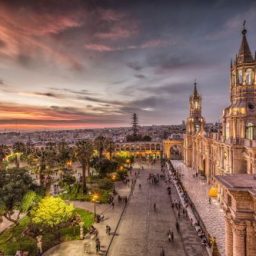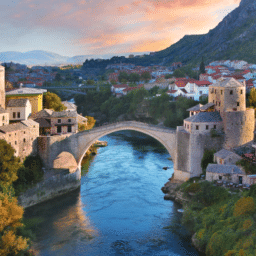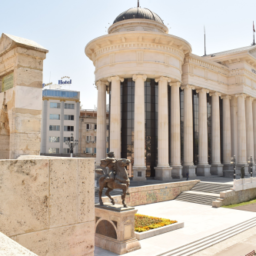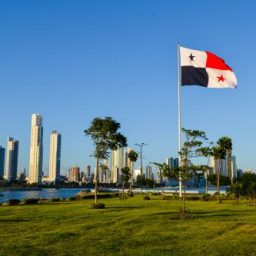

Moldova is a small country located between Romania and Ukraine, with a long and complicated history. It is also a home to a rich culture and an extremely diverse population. But what about its language? What is the mother tongue for the people of Moldova?
In this article, we will delve into the language of Moldova – its history, characteristics, but also tell you what foreign languages the majority of the population knows. You will also find some useful phrases that will allow you to communicate with the inhabitants of Moldova.
Contents
What is the official language in Moldova?
It would seem logical that Moldovan would be the official language of the country. However, the matter is a bit more complicated, because formally the official language is Romanian. It all came as the result of the Constitutional Court of Moldova’s 2013 decision, according to which the name ‘Moldovan language’ is only a term for the Romanian language used in the country. The Moldovan language itself is classified as a dialect of the Romanian language. It has a regional character, as it is used mainly in Moldova and a small part of Romania. For the most part, Moldovan, like Romanian, is written in the Latin alphabet.
However, in Transnistria, a separatist region of Moldova not recognized by the international community, the matters of language fare a bit differently. Here, the Moldovan language written in Cyrillic has retained the status of an official language and is considered a separate language.
Nevertheless, the phrase ‘Moldovan language’ generally means the Romanian language used in the territory of Moldova and should be understood as such, since there are no significant differences between the official Romanian and Moldovan languages.
Interestingly, some linguists believe that the Moldovan language could have been the first, and Romanian is derived from it, and that Romanian is a variant of the Moldovan language, not the other way around. The most important argument in favour of this theory is the fact that the Romanian literary language developed in the area of the modern Moldavian dialect. Additionally, numerous discovered Moldovan literary texts are dated to be the earliest among the entirety of Romanian texts.
The Moldovan language is spoken by the vast majority of the 3.5 million inhabitants of Moldova and the Moldovan minority living in Romania and Ukraine. In addition, the number of people using the Moldovan dialect in Romania alone is estimated at over 6 million, which is almost twice the population of the country from which this dialect originates.
History of the Moldavian language
The history of the Moldavian language is linked to the history of Moldavia itself. The country has been ruled by various countries and cultures over the centuries. Moldavian, like Romanian, is one of the Romance languages derived from Latin. This language developed in what is now Romania and Moldova, and its history dates back to the 8th century.
In the Middle Ages, there were several principalities in what is now Moldavia. They were dominated by cultural influences from Russia and Poland. At the beginning of the 14th century, this area came under Tatar rule, and in the 15th century it was conquered by Turkey. During this period, Moldovan literature and culture developed, and the Moldovan language began to take its characteristic shape.
In the 18th century, Moldavia became a fiefdom of Turkey, and in the 19th century it fell under the Russian rule. At that time, the Moldovan language was used mainly in literature and poetry, and the Moldavian population mainly spoke Russian in everyday life.
In the 20th century, Moldova became part of the Soviet Union, and the Moldovan language was relegated to just one of the dialects of the Russian language. Only in 1989, after the dissolution of the Soviet Union, the Moldovan language was again recognized as a separate language and the official language of Moldova. In 1991, Moldova declared its independence and the Moldovan language became a symbol of national identity.
Today, most of the population in the territory of Moldova speaks Moldovan in everyday communication, and Romanian is used in schools and as an official language. The Russian language is also widely used in everyday life, business and public administration.


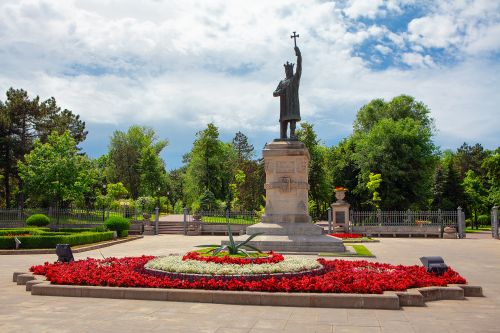
Characteristics of the Moldovan language
Moldavian is one of the Romance languages and is closely related to Romanian, which is the official language of Romania. Moldovan and Romanian are almost identical in terms of grammar, vocabulary and phonetics, and differ mainly in spelling, due to the influence of Cyrillic and Latin alphabets in Moldova. Nowadays, only the Latin alphabet is used to write both languages.
The Moldovan language has a distinctive accent that is different from the Romanian accent. The vocabulary of Moldovan is rich and includes words from Romanian as well as many borrowed terms from Russian, Turkish, and other languages.
The Moldovan language also has its own literature and poetry, which often deals with topics related to the history and culture of Moldova. Modern Moldovan literature is also strongly related to Romanian, with many writers publishing their works in both languages.
Basic Romanian phrases for visitors to Moldova
If you plan to visit Moldova, you will find these basic Romanian phrases useful. Here are a few of them:
- Hello – Buna dimineata
- Hi – Bună
- Welcome – Salut
- Good evening – Bună seara
- Goodbye – La revedere
- See you later – Ne vedem în curând
- Goodnight – Noapte bună
- Have a nice day – O zi bună
- I’m from… – Sunt…
- My name is… – Numele meu este…
Salutation phrases in Romanian
- Yes – Da
- No – Nu
- Thank you – Mulțumesc
- Please – Vă rog
- Sorry – Scuzati-ma
- How are you? – Ce mai faceți?
- Good – Bine
- Very good – Foarte bine
- Bon appétit – Bucura-te de masa ta
- Cheers – Să vă binecuvânteze
- Greetings – Salutari
Knowledge of foreign languages in Moldova
Moldova is also a relatively multilingual country, and its inhabitants have an above-average knowledge of foreign languages. Due to the fact that Moldova borders Ukraine and Romania, the languages of these countries are widely spoken in the country and are an important part of everyday communication.
Another widely known and used language is Russian. Most of the older Moldovans who grew up during the Soviet Union period speak it fluently. The younger generations are also often taught Russian in schools and at home, but they do not always know it as well as the elder.
However, they know English well. It is a language taught in schools and often chosen during language courses. It is particularly important for Moldovans in the context of the labour market, international cooperation and the development of tourism in the country.
Other languages such as French, German, Spanish, Italian and Turkish are also taught in schools and universities in Moldova, but knowledge of these languages is usually limited to those with specialized education.
Due to the proximity of the Ukrainian border, the Ukrainian language is also well known in Moldova, especially in its eastern part. In the regions of Moldova where the population is dominated by the Ukrainian minority, Ukrainian is used on a daily basis.
Moldavian with Skrivianek
Moldovan is a language with a rich history and culture. It is a language that is spoken by the majority of the population of Moldova, and with which they have a special connection. So, it might be worth investing time and energy into learning Moldovan to better understand the culture and life in Moldova.
If you don’t know Moldavian enough, and you need a translation from Moldavian into Polish or from Polish into Moldavian, contact us! Our Moldavian translator will help you.

